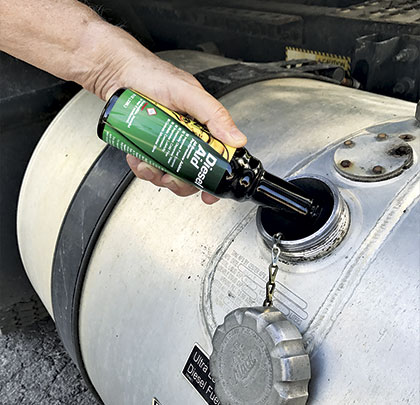Whatever the season—summer or winter—most fleet owners’ business and productivity goals make it necessary for them to keep their vehicles working throughout the year. Of course, during this time, the type of care they need depends on whether they have gasoline or diesel engines, because each engine type poses its own challenge and hence, calls for its own unique cure and care regimen.
PREVENTING CONTAMINATION
Owners of fleets with diesel engines are aware that diesel fuel is inclined to gel in the winter when the temperature drops and the paraffin in the fuel begins to solidify. Over time, this wax-like substance clogs the fuel line and the fuel filter, and prevents the free flow of fuel, making it harder to start the engine.
Even worse is the presence of water in diesel fuel. In fact, water is the No. 1 contaminant of diesel fuel. Although the fuel is relatively free of water when it leaves the refinery, it (water) enters the mix through several other ways—during the delivery process, through atmospheric variables, condensation, and leakage. Care, therefore, should be taken to ensure the purity of the fuel at all points to prevent water from entering the tank.
Condensation inside the tank can cause diesel sludge, an algae-like substance, to form and settle at the bottom of the tank. Debris from the storage tank can also get into the fuel tank and, over time, get stirred up and enter the vehicle’s engine.
SOLUTIONS TO ISSUES
“Additives and fuel treatments are especially formulated to address these issues,” says Christopher Miller, vice president, E-ZOIL, manufacturer of high performance additives and cleaners. “Our in-house chemists develop specific additives and cleaning solutions to help fleet owners protect their diesel vehicles and equipment.”
Although one may see a plethora of additives on aftermarket shelves, selecting one that can work throughout the year is key to the most cost-effective and efficient answer to diesel fuel related problems.
“Fleet owners that are looking to keep their diesel engines working all year-round, avoid maintenance costs, and reduce downtime without compromising power and performance, should consider using additives,” suggests Miller.
For example, E-ZOIL offers Diesel Aid an all-season performance diesel fuel additive formulated to disperse water, improve cold flow and lubricity, inhibit corrosion, control the formation of microbial slime, and improve fuel economy.
For More Information:
Founded in 1980 with headquarters near Buffalo, New York, E-ZOIL manufactures a complete line of performance-enhancing fuel additives and cleaning solutions for fleet owners, owner-operators, and consumers to protect their diesel vehicles and equipment. E-ZOIL specializes in highly-concentrated formulas developed by the company’s in-house chemists and backed by more than three decades of expertise. E-ZOIL products improve vehicle power and mileage, reduce costly breakdowns and downtime, assist with preventive maintenance, and enhance and protect vehicle appearance. For more information, visit www.ezoil.com.
_________________________________________________________________________
Modern Contractor Solutions, March 2018
Did you enjoy this article?
Subscribe to the FREE Digital Edition of Modern Contractor Solutions magazine.



